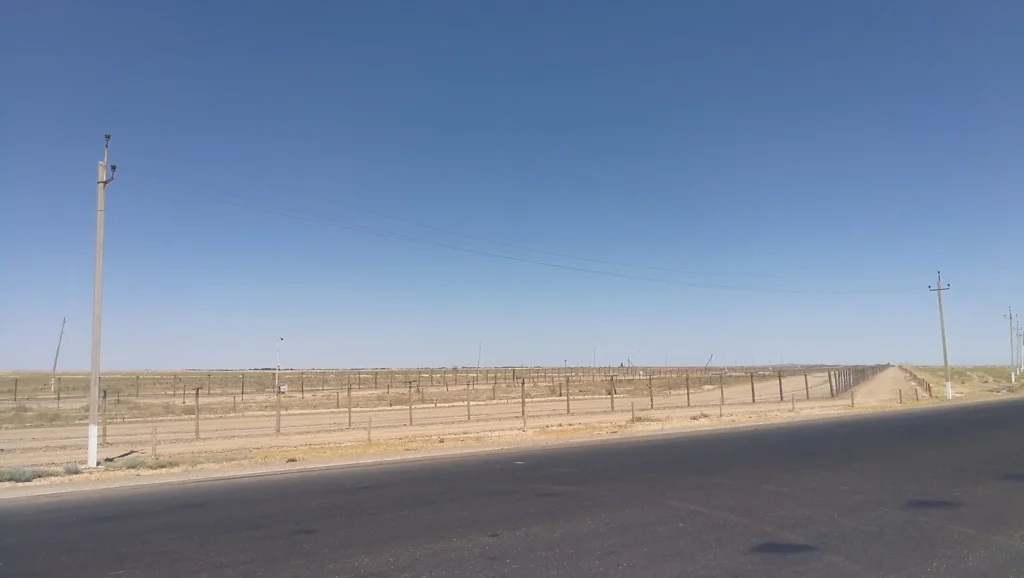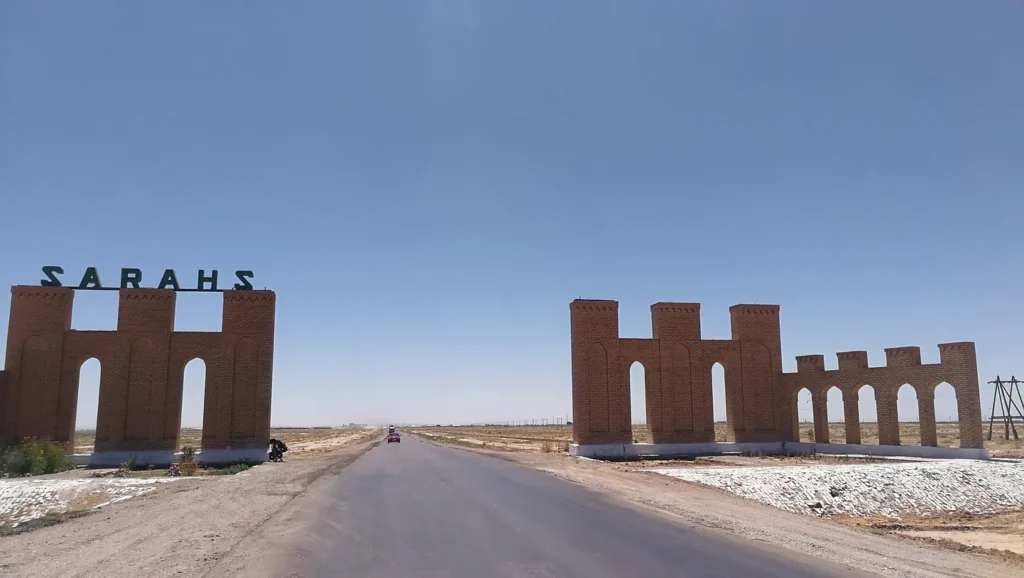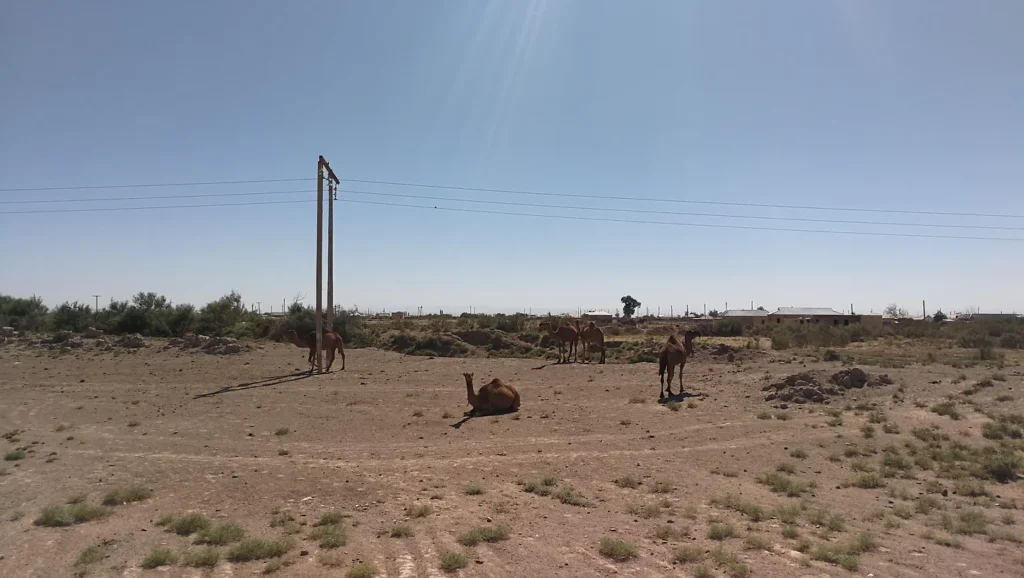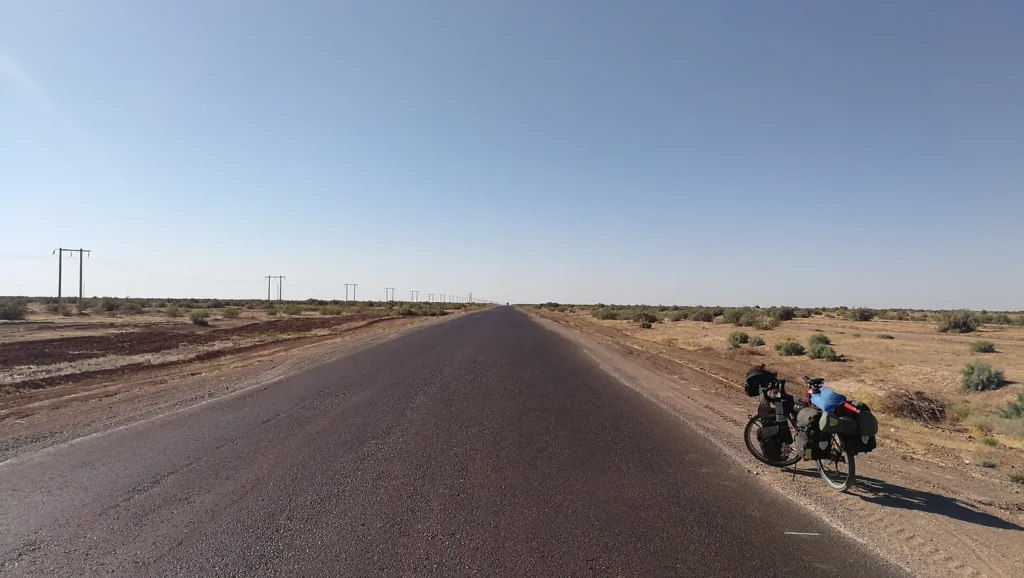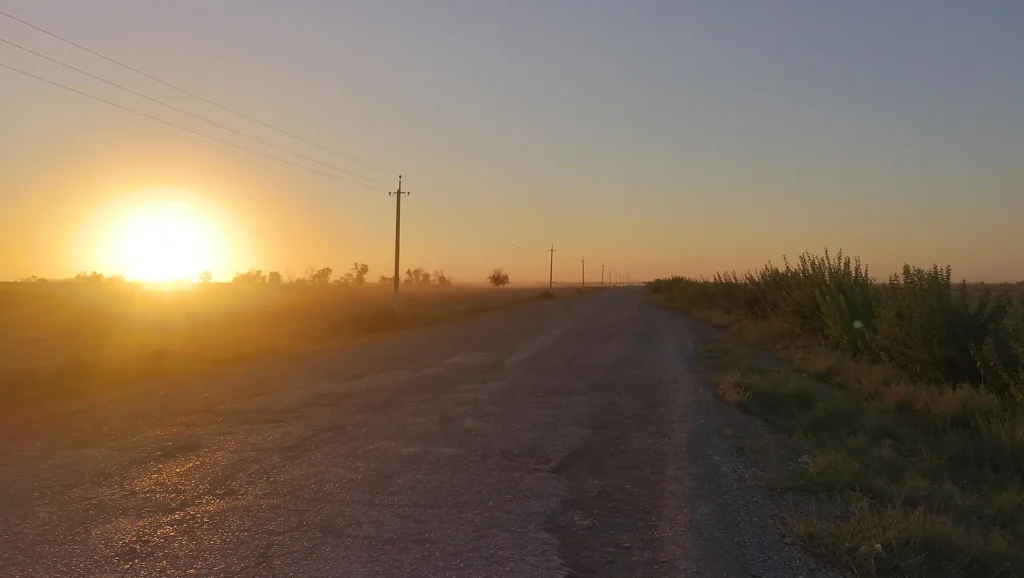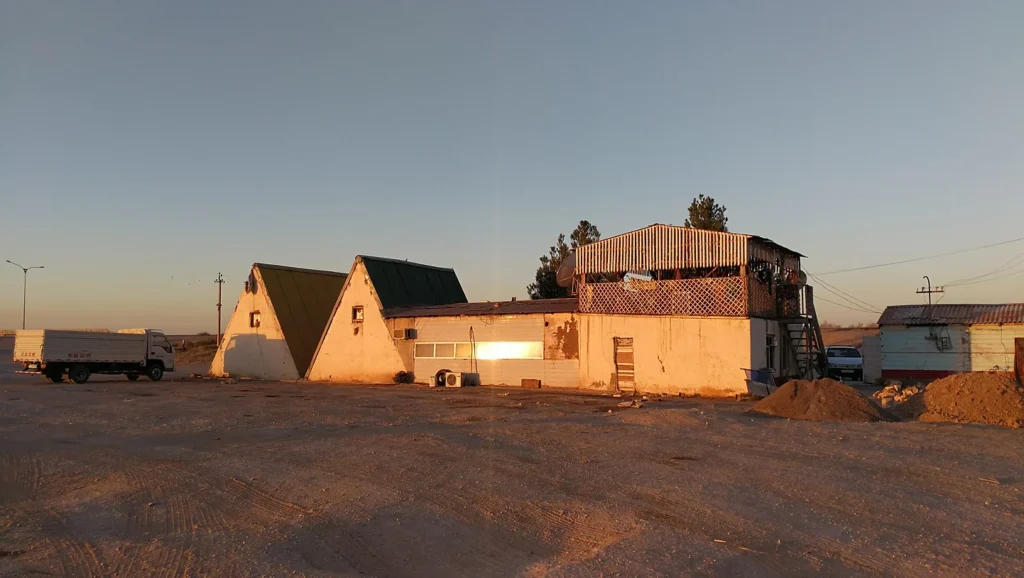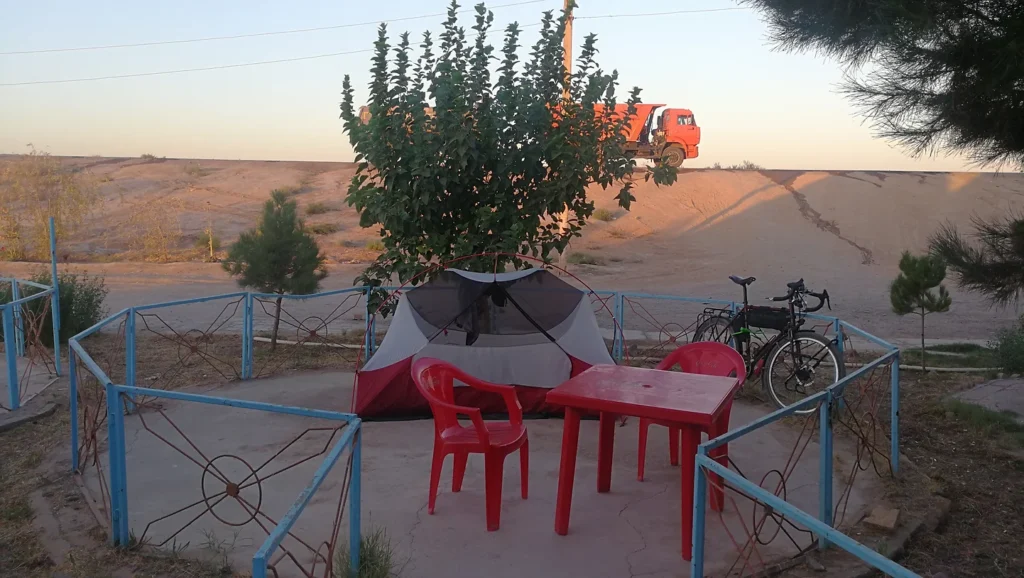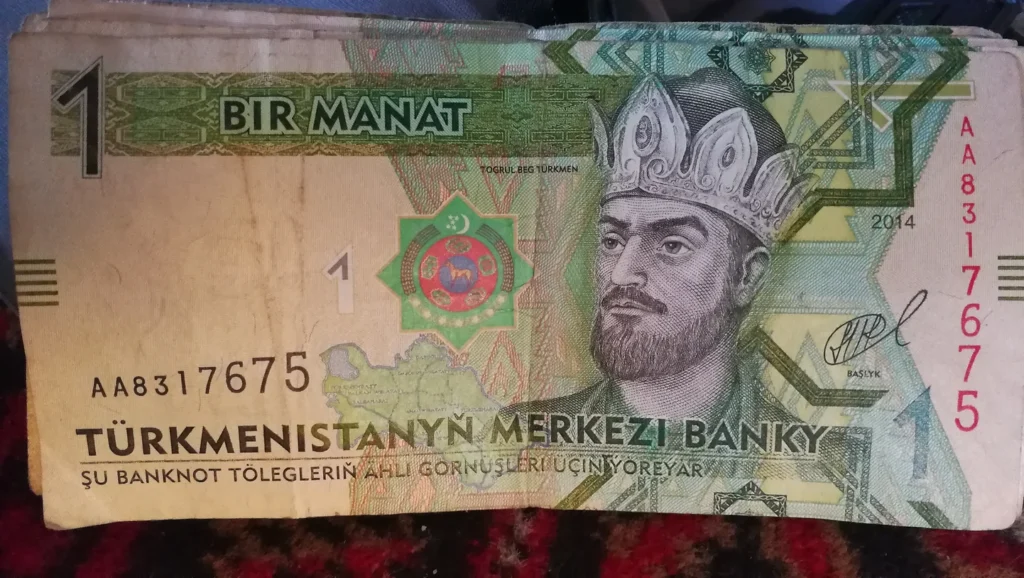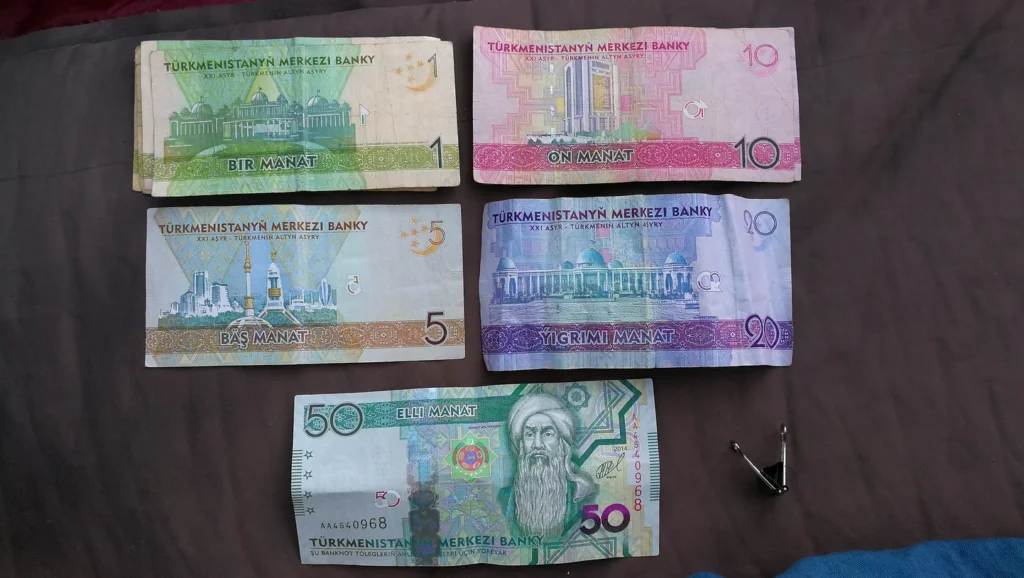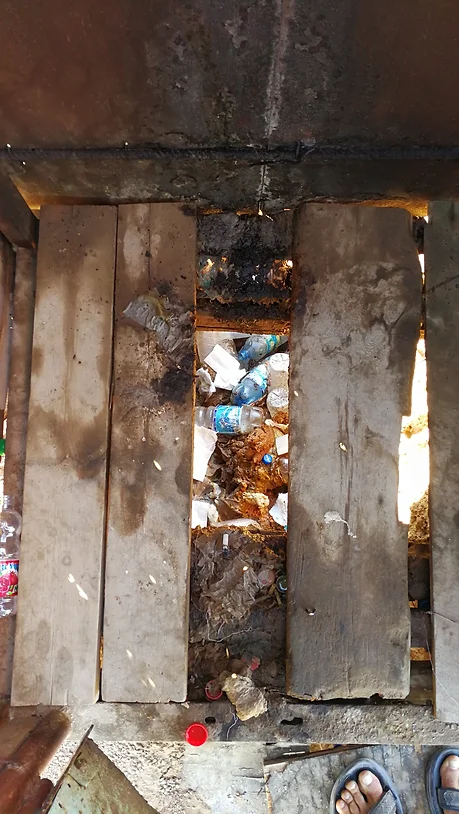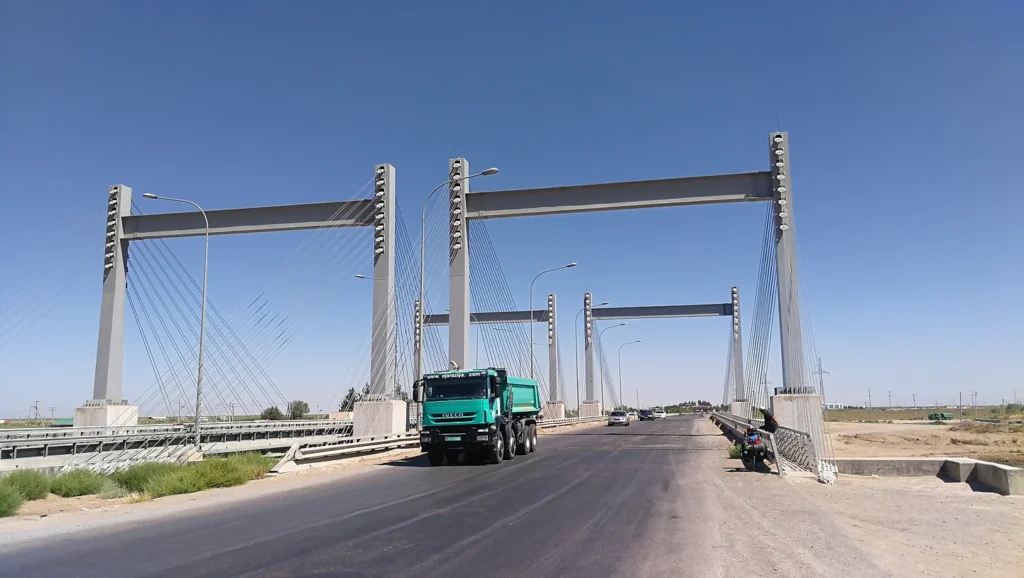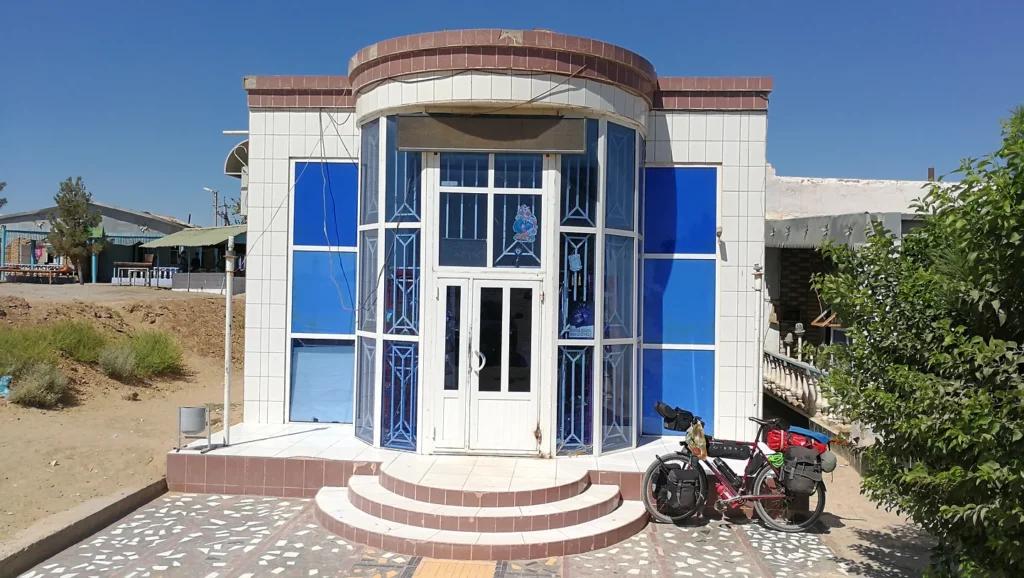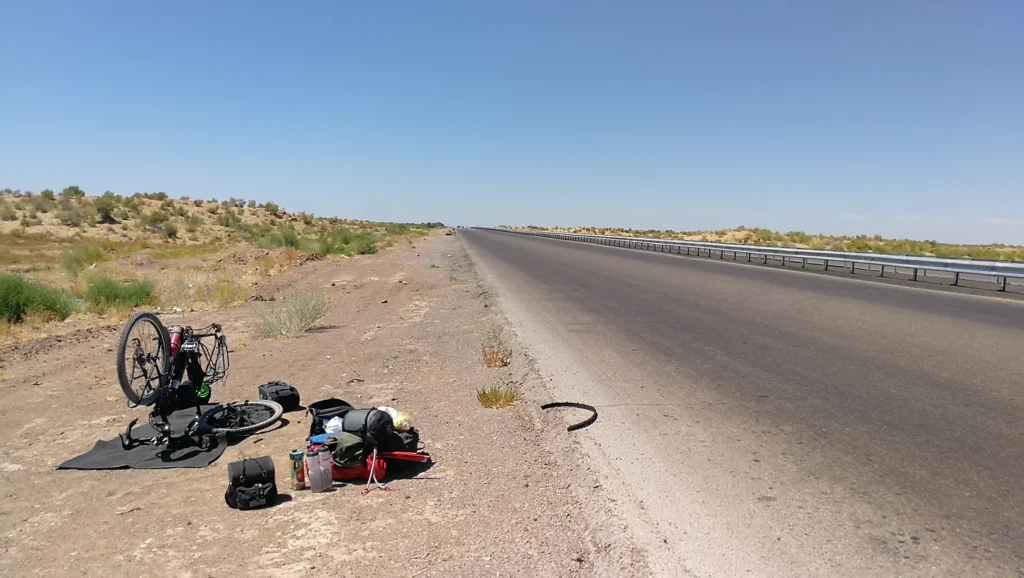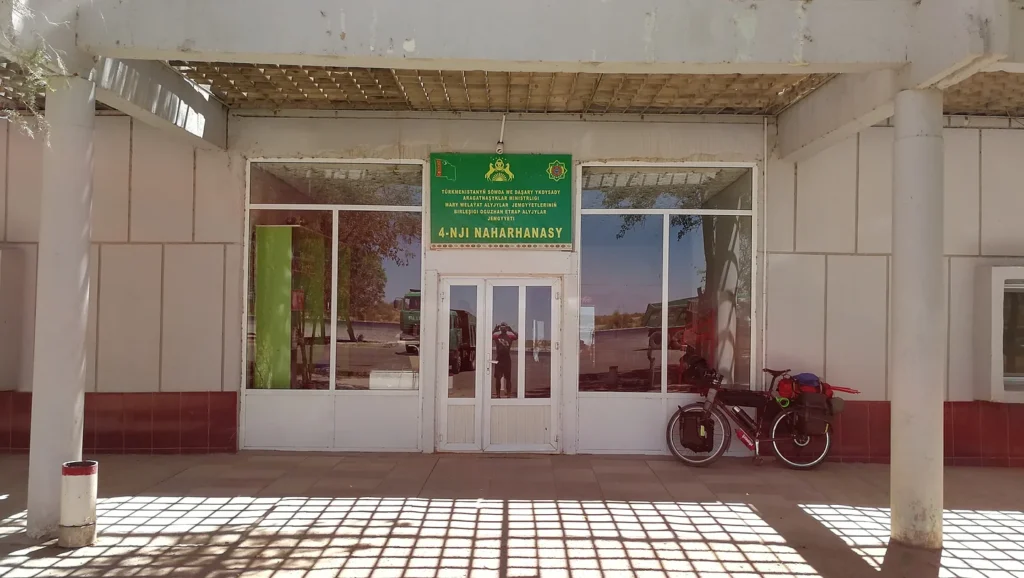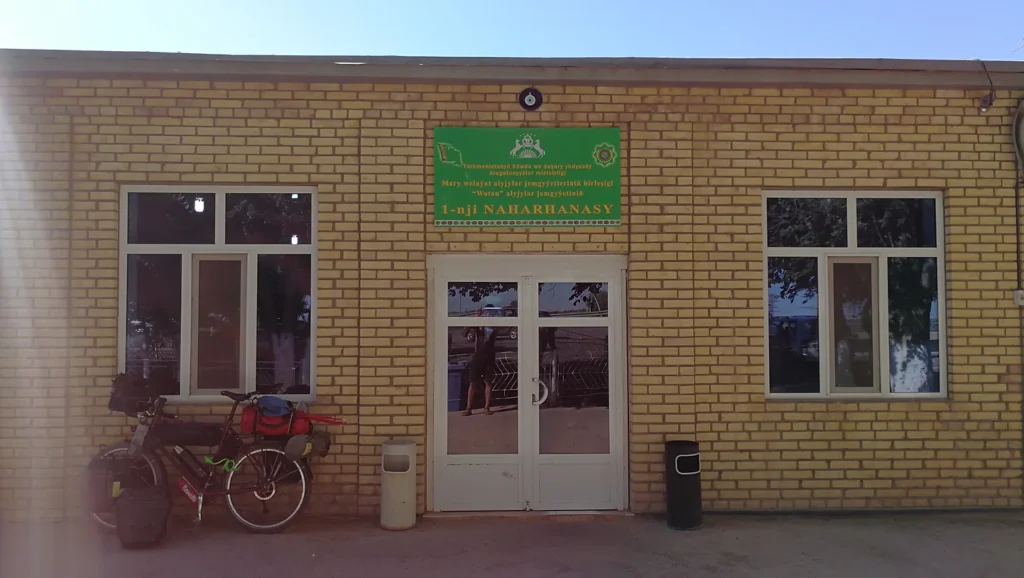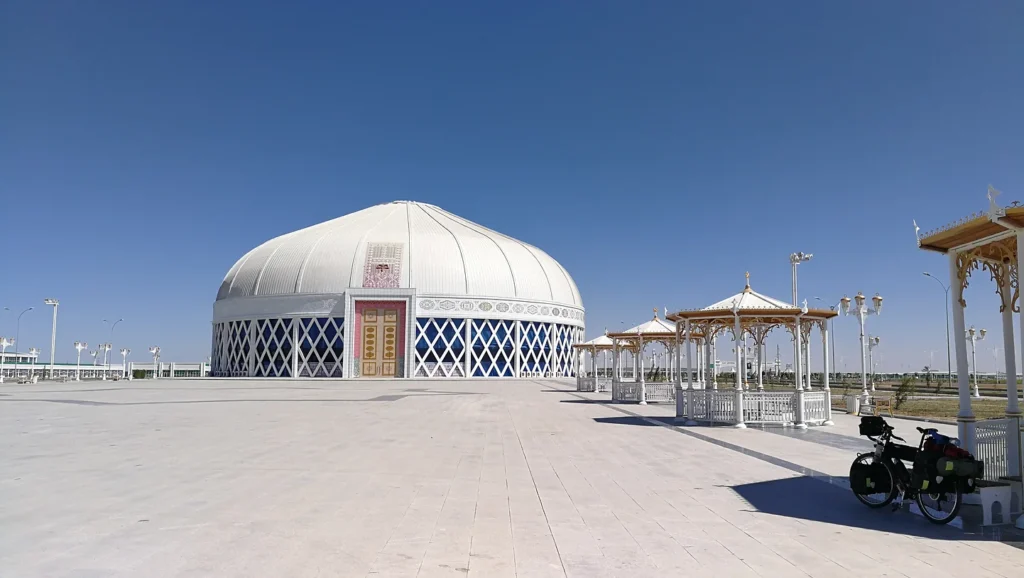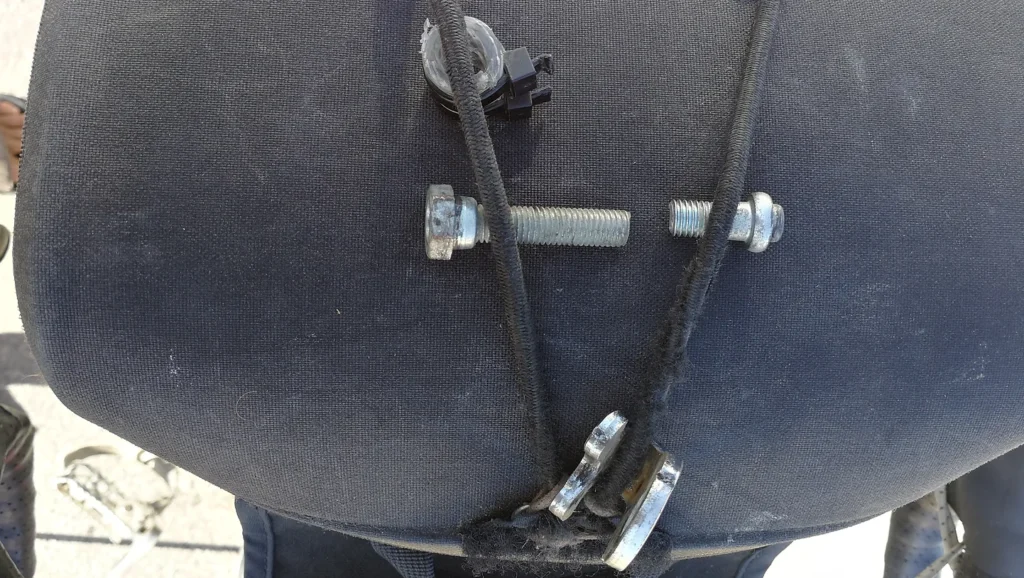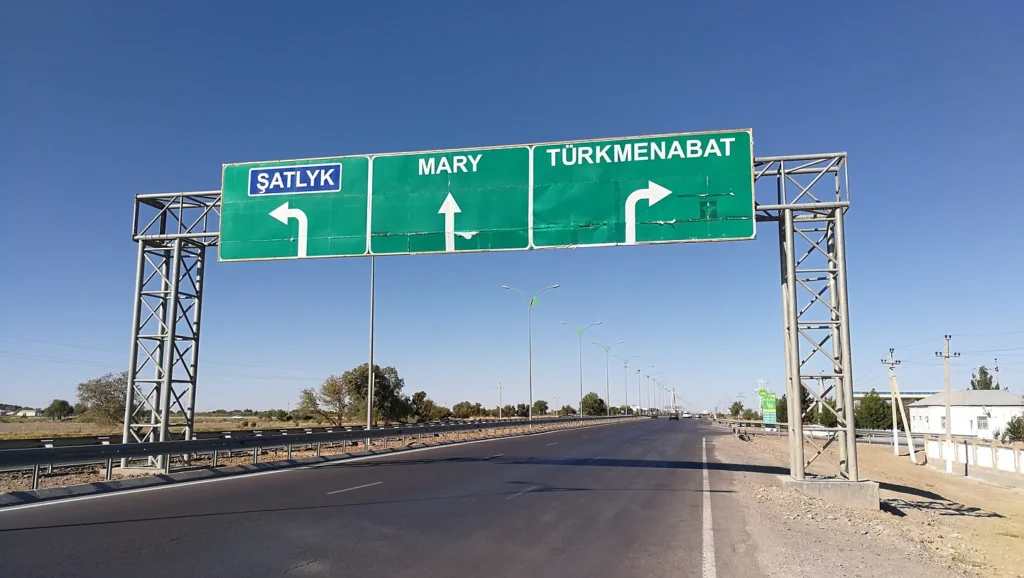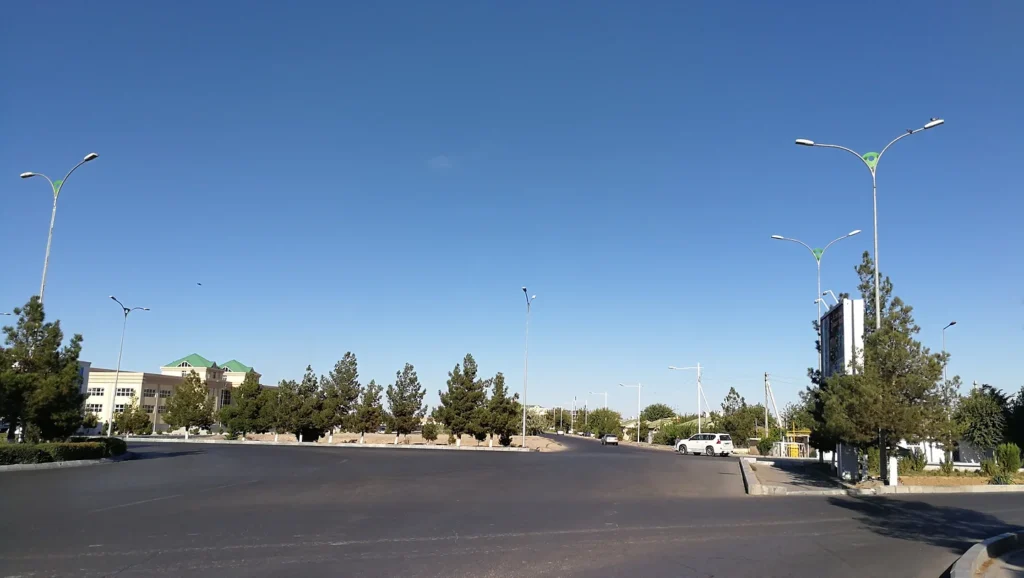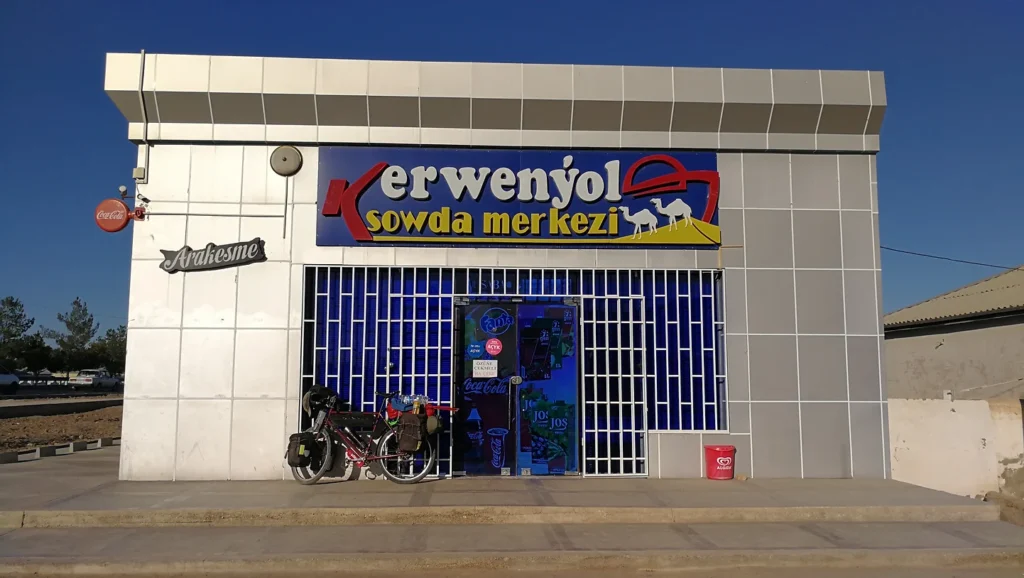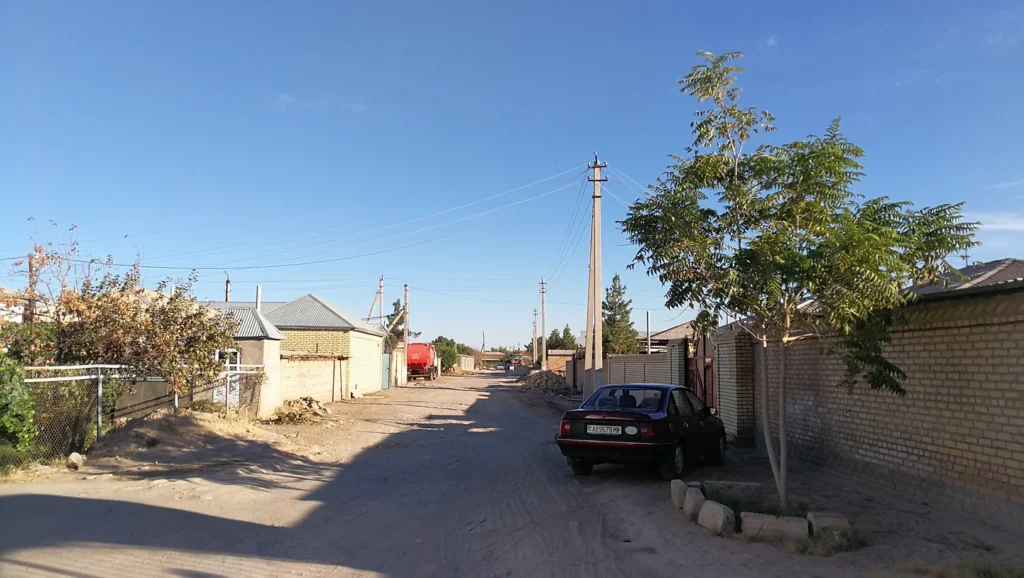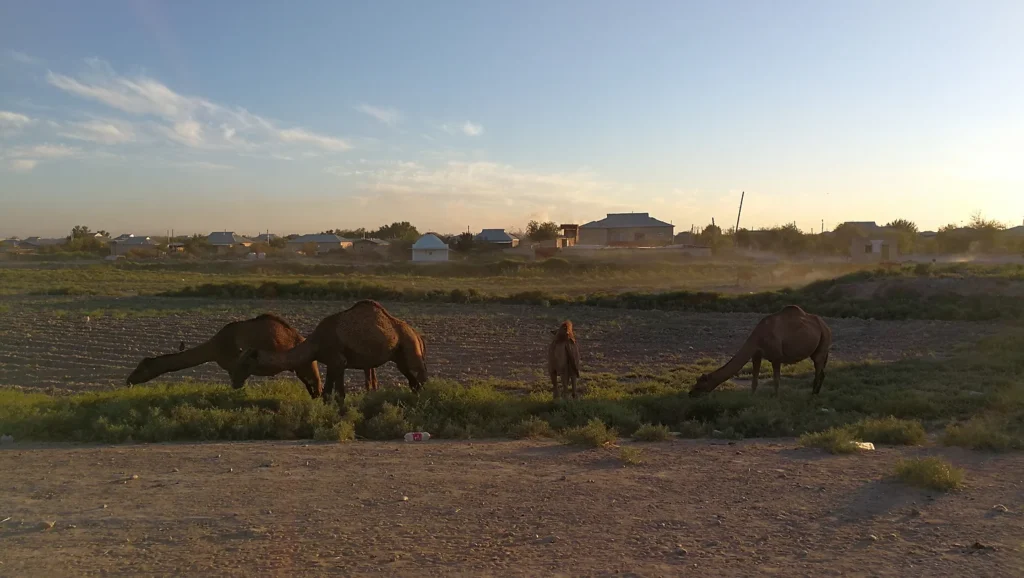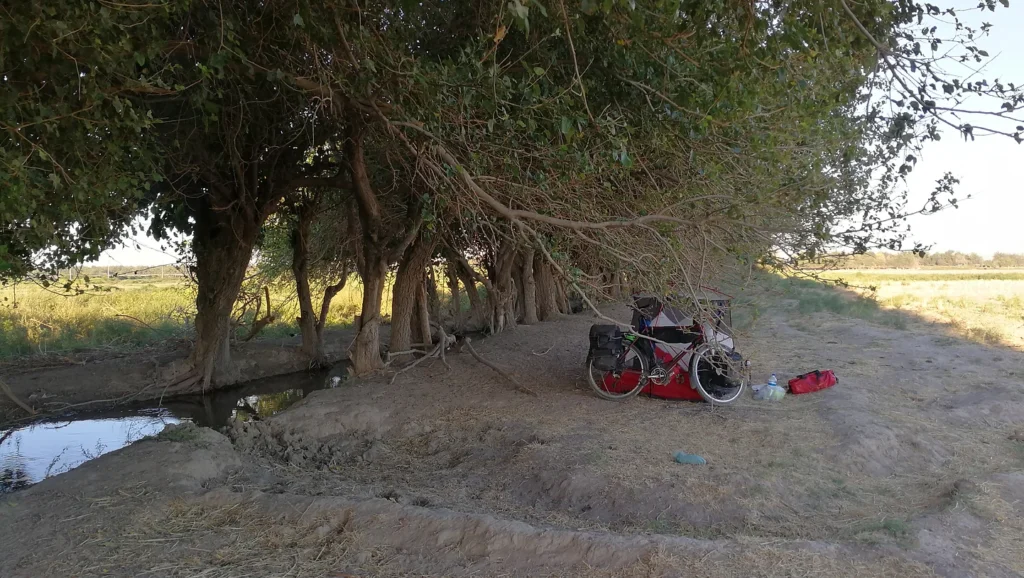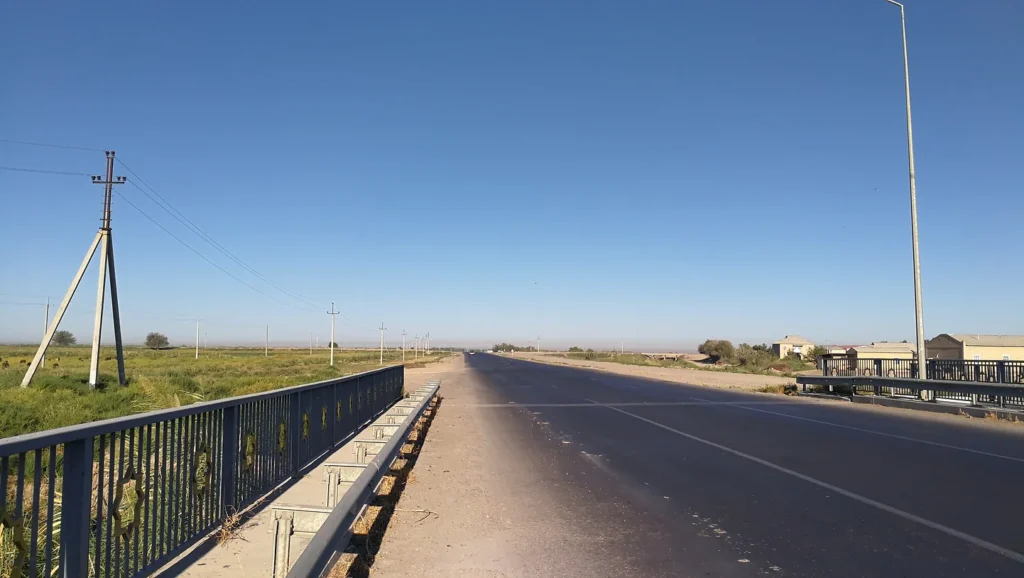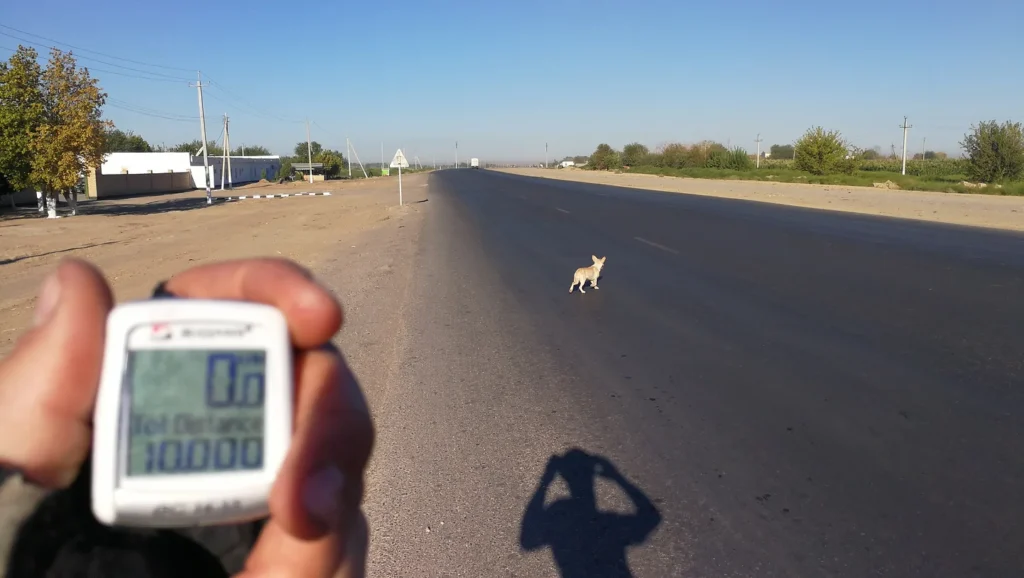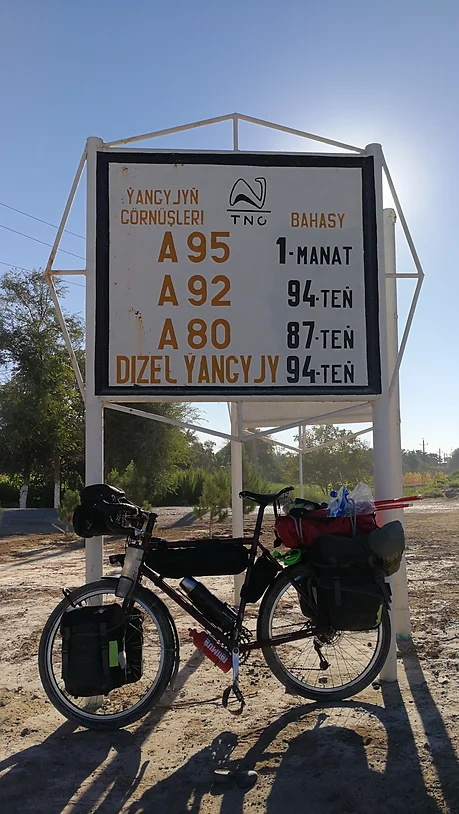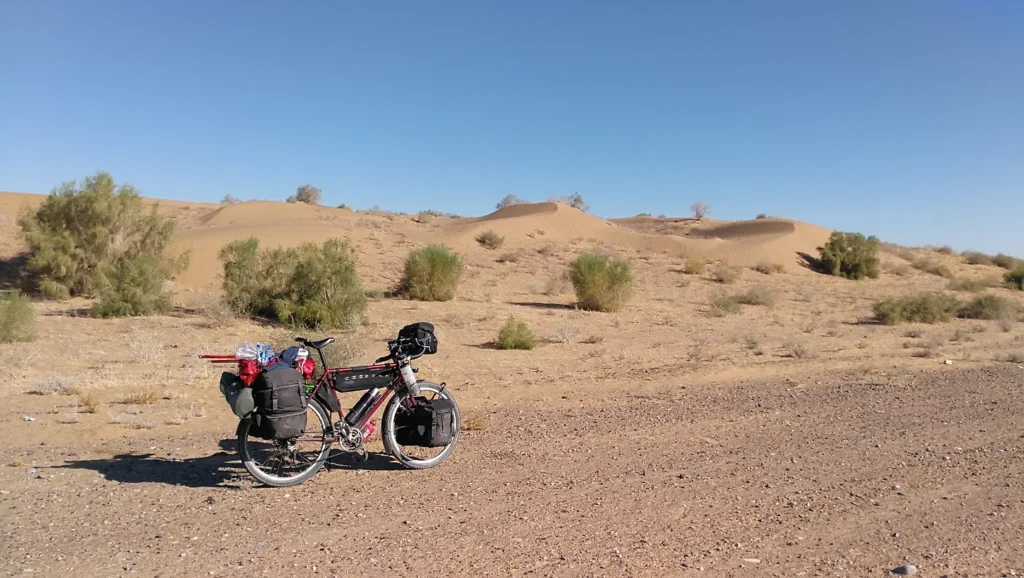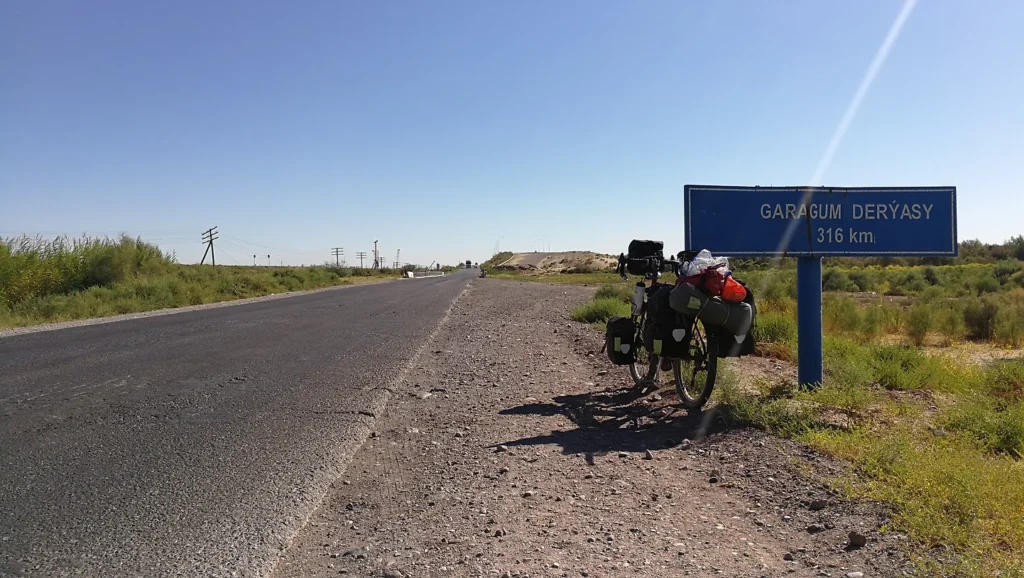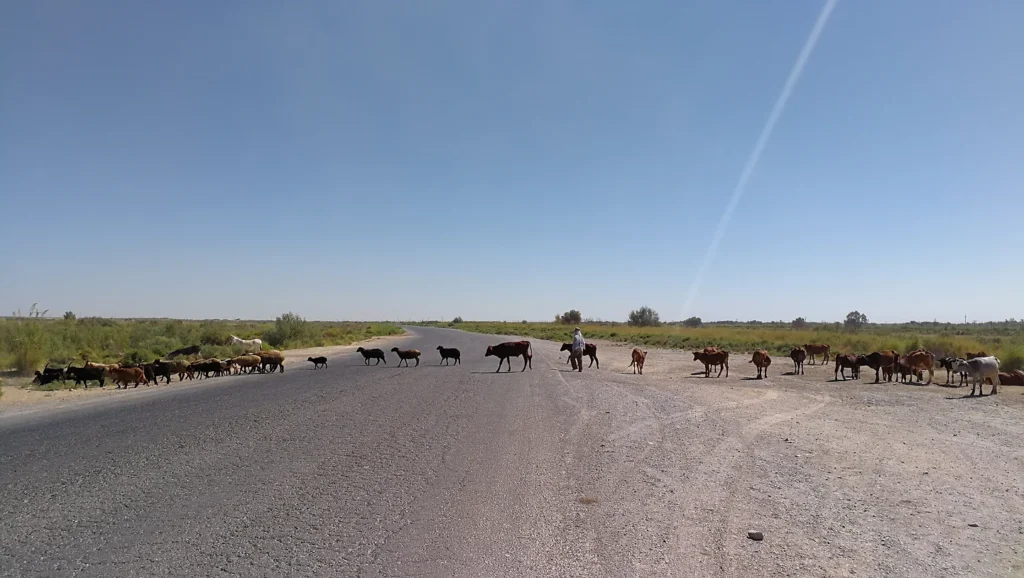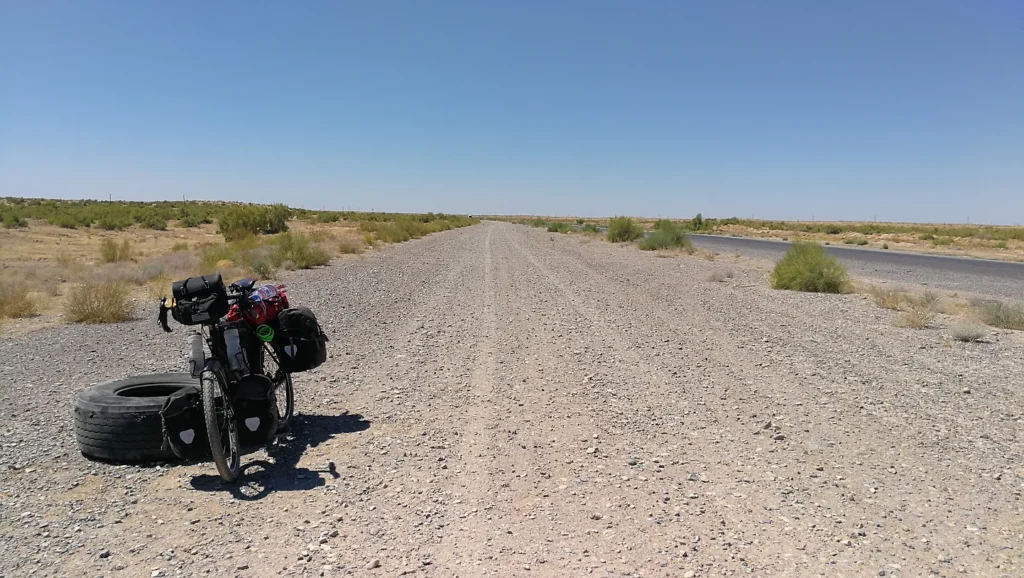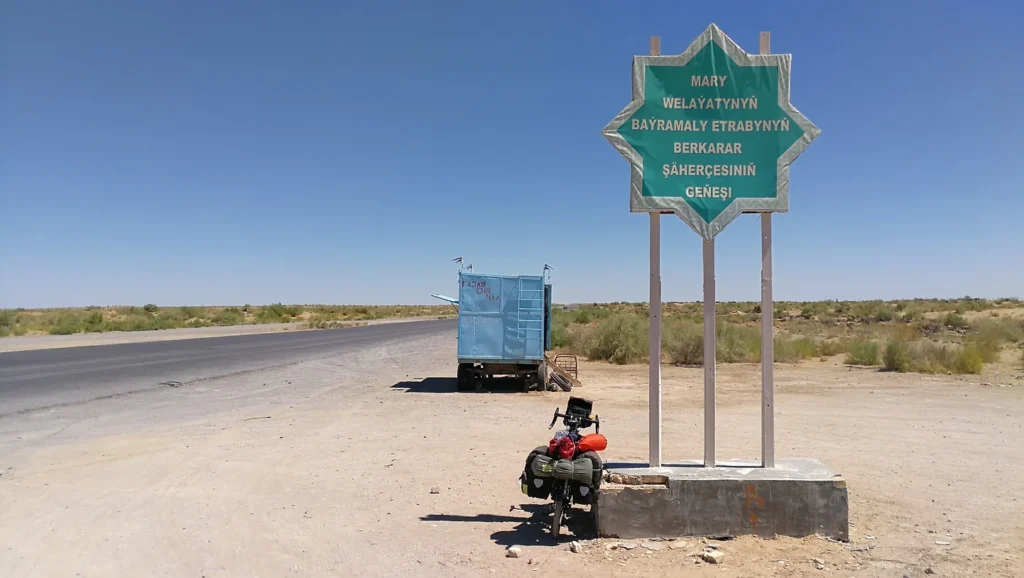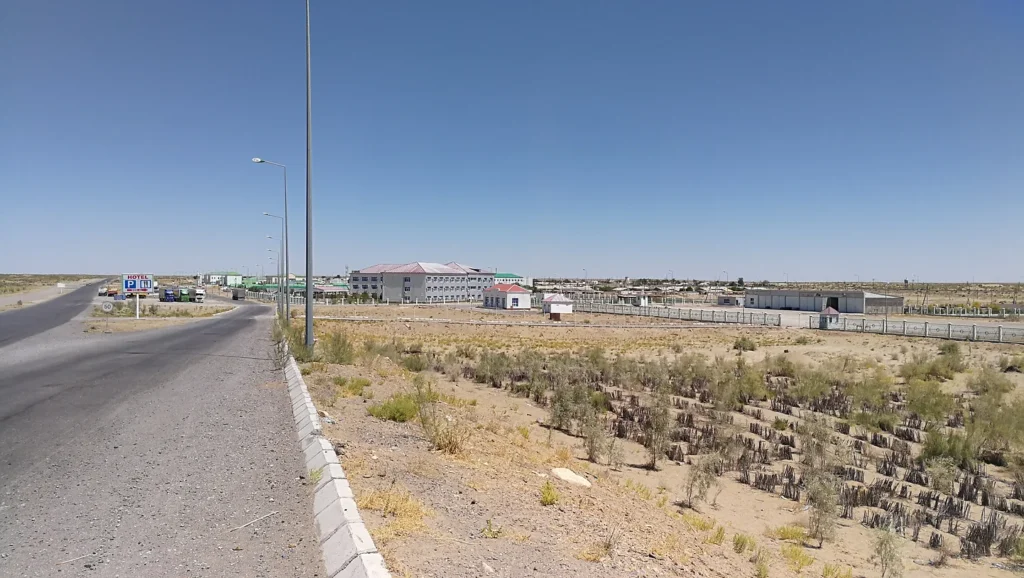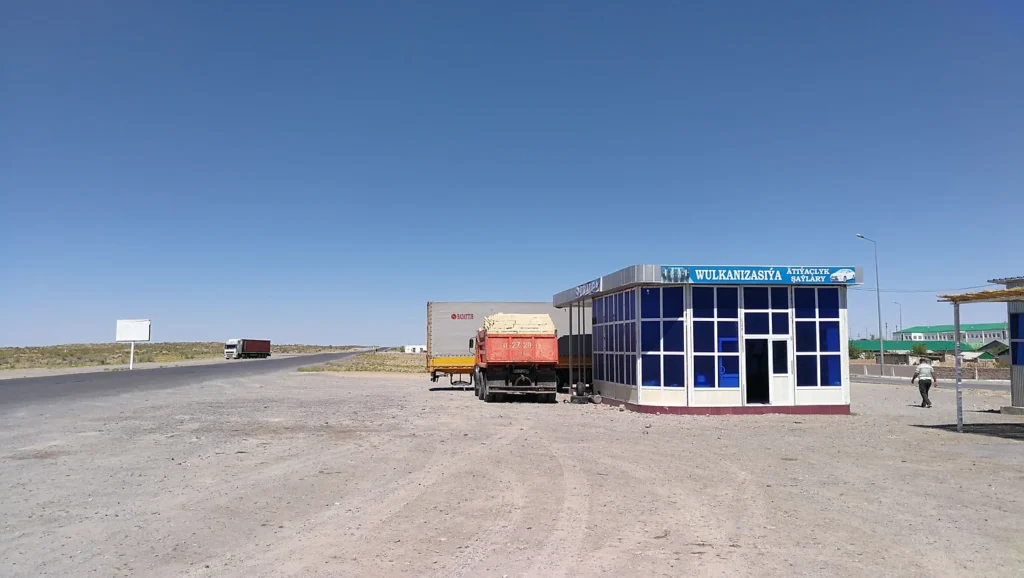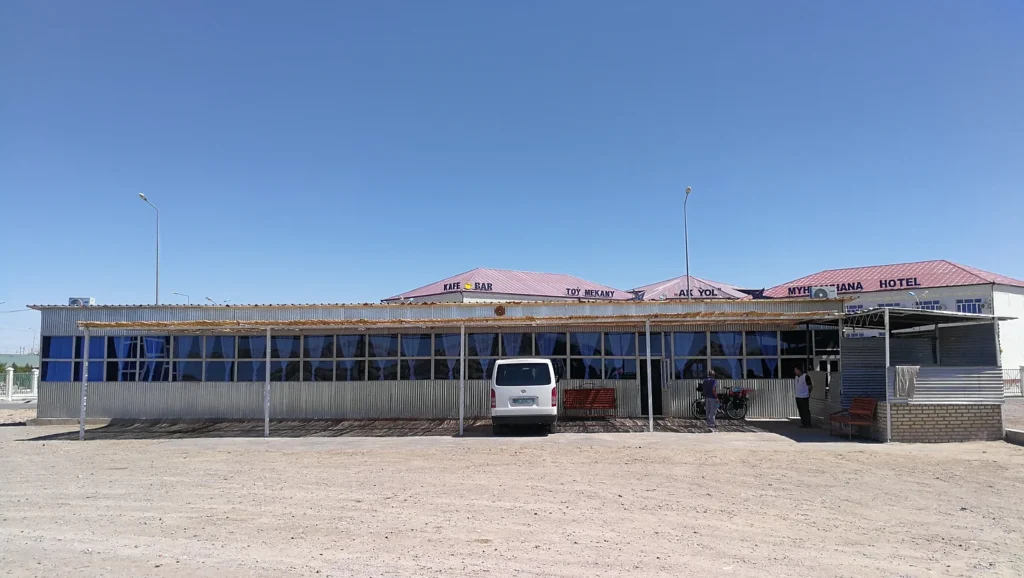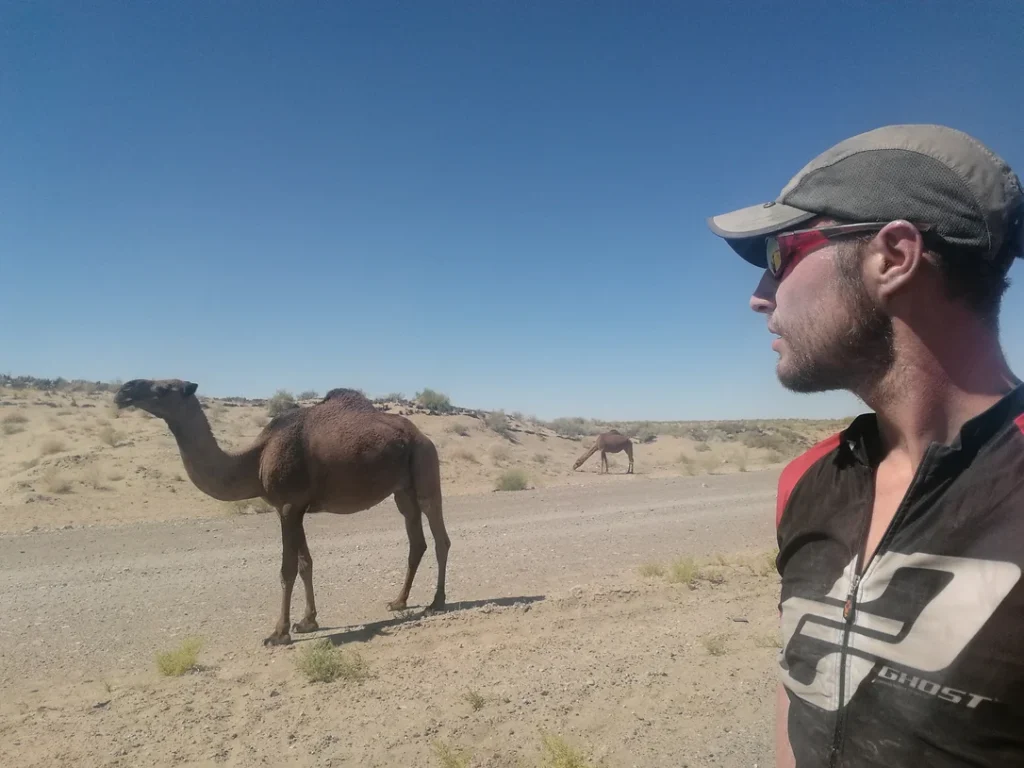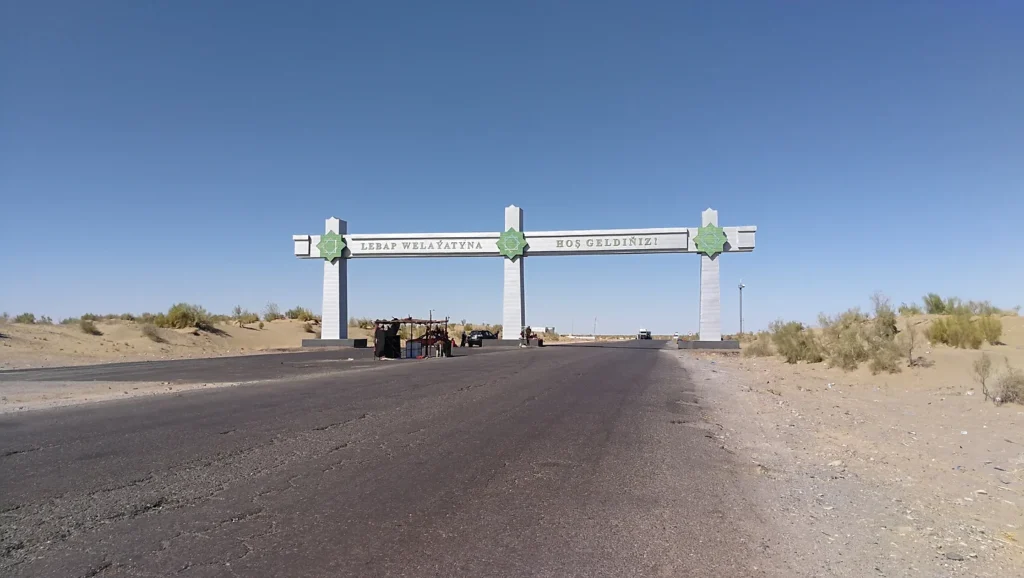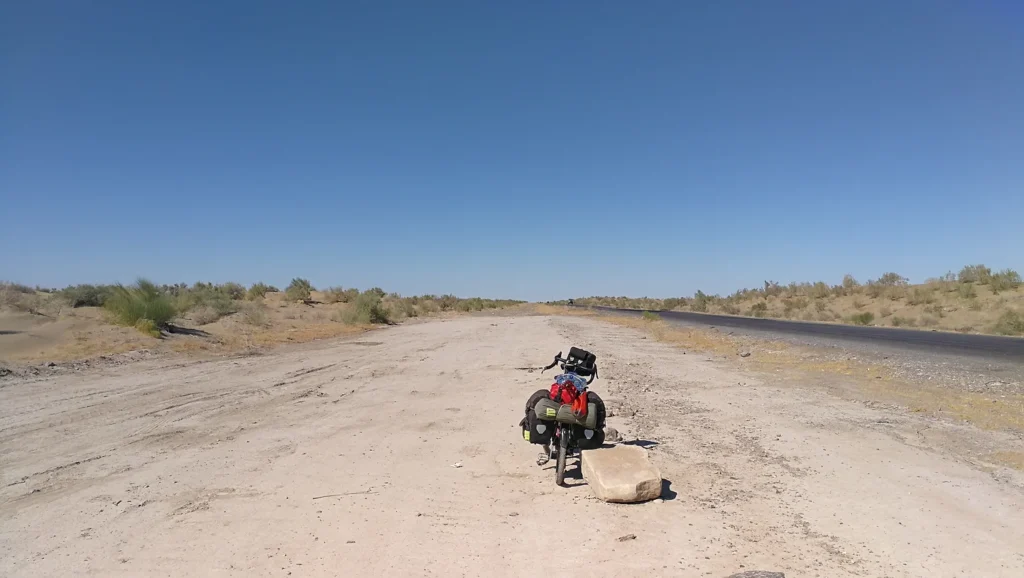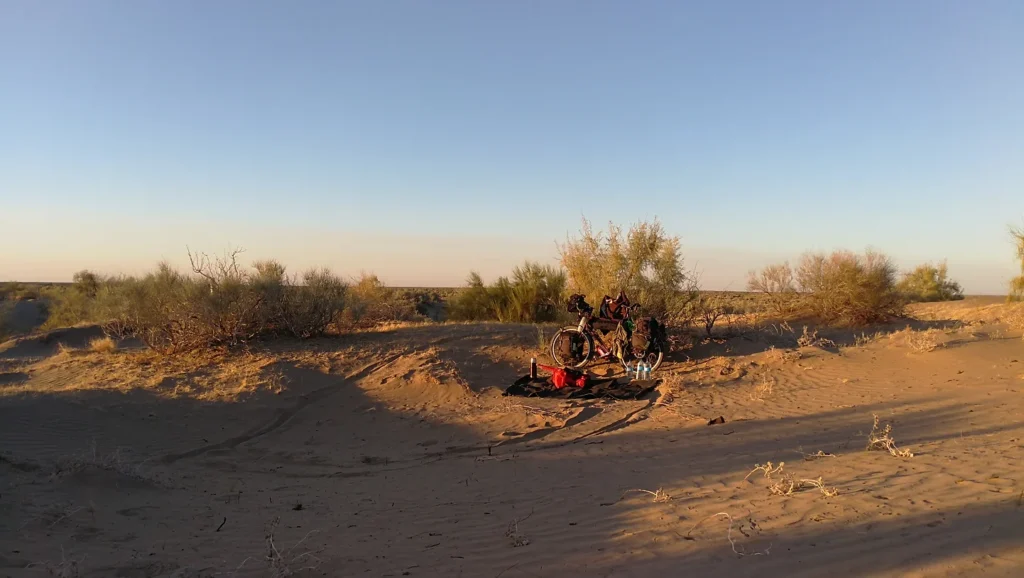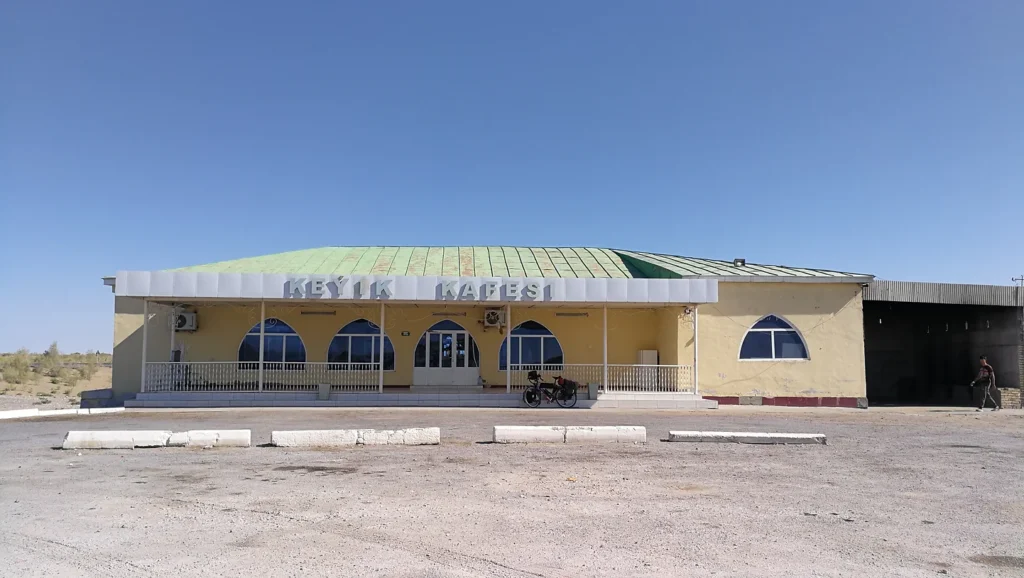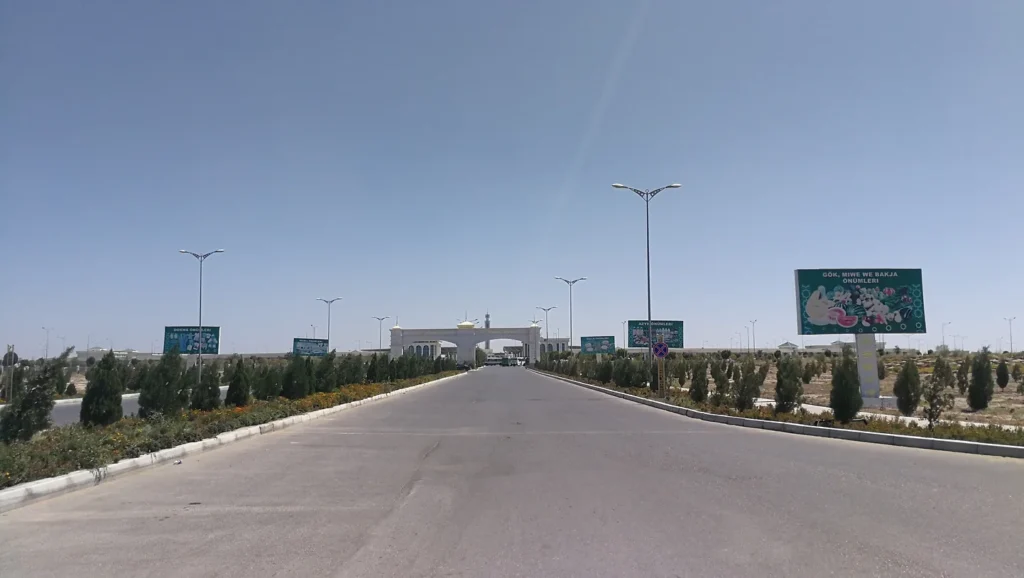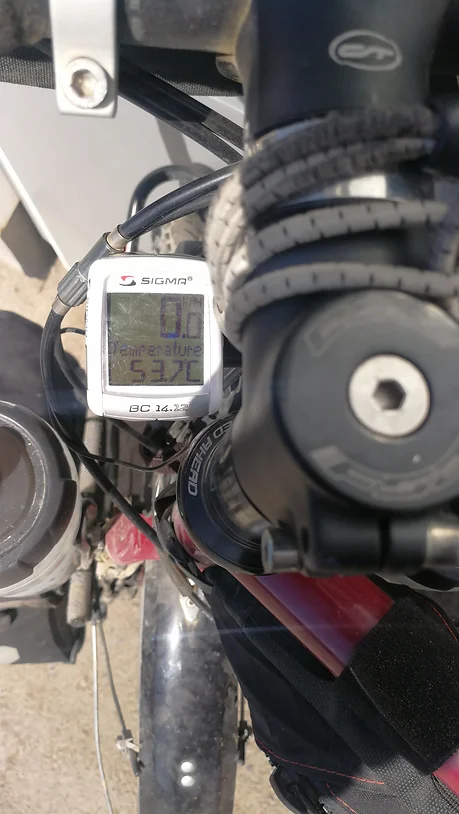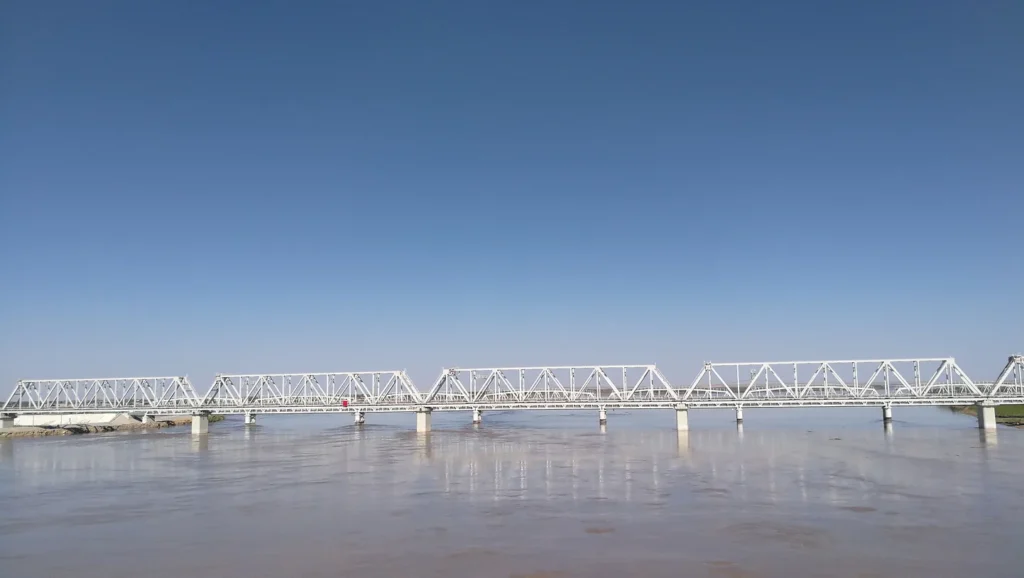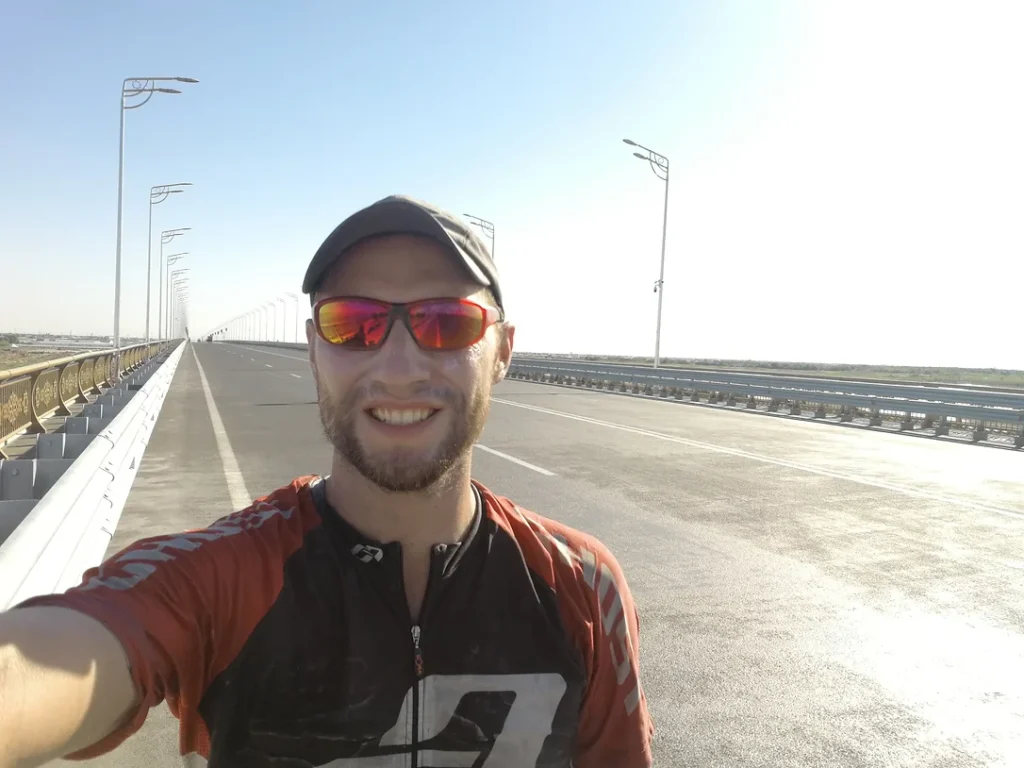Turkmenistan — Leadership
At 8am I showed up at the Iran border crossing. The gentleman from the customs first checked my USB stick for one hour and then gave me tips for the border crossings in the countries ahead: first aid kits may not include certain painkillers when entering Uzbekistan due to strict medicine import restrictions.
The no-man’s land between the checkpoints was secured with barbed wire fences, cameras, and a German shepherd barking a dutiful goodbye.
The Turkmenistan border building is massive and full of polished marble. The first stop when you enter is a quick health check by a doctor.
Multiple passport checks, face pictures and fingerprints taken, x-raying of my equipment, medical kit search, customs declaration, electronics check – I saw about 15 border officials and soldiers but no other travelers in the two hours I spend there.
After the officials had done their job of being tough, they relaxed and became humans with curiosity. They gathered around me and watched with interest while I repacked my spread out equipment and mounted everything back on the bike.
My Turkmenistan transit visa was valid for 5 days for the route Sarahs to Farab – about 500 km, mostly desert, and notoriously windy. When I departed from the checkpoint the senior officer who had previously questioned me in detail about my route didn’t hide his admiration and wished me an honest and warm “Good luck mister!“.
In Sarahs I changed only 10 USD at an official bank given the bad exchange rate – I knew that an unofficial money changer would give me double the Manat per dollar and I was optimistic to find one on the route.
Already in Mashhad I had restocked food supplies like rice and porridge for all the way through the remaining Iran stretch and Turkmenistan, so except for water I was self-sufficient.
Pretty strong headwind, slow progress. I entered Turkmenistan with an 8 liter water reserve so today I didn’t really care how far I would make it and I just enjoyed the desert experience.

Turkmenistan is a country much larger than Germany in size but with only 6 million inhabitants. The entire economy basically consists of gas and oil exports, and a bit of cotton farming.
Pretty good tarmac, zero traffic – good cycling conditions.
With fewer visitors than North Korea and the usual requirement to join a pre-planned tour with a guide – why does Turkmenistan allow a few cyclists per year to transit the country alone?
Perhaps because the president is a cycling fan?
In any case, I felt grateful for the transit permission Turkmenistan had granted me. And like in all countries I wanted to experience this country unprejudiced and open to what I would find on the road.
In the last daylight I reached a truck stop where the friendly locals invited me to camp for free on their veranda. Dobry vecher, kak dela? (Good evening, how are you?) … a little bit of local language goes a long way to build a connection and trust.
I watched TV with the truck drivers, ate delicious baked fish with lots of spices, and put the bit of Russian I had learned before my trip into small talk practice. Speaking some Russian is definitely good on the Silk Road – it helps in Bulgaria, Georgia, Turkmenistan, Uzbekistan, Tajikistan, and Kyrgyzstan.
While spending time with the truck drivers, I wondered how much they cared for politics in their country and how much for their inner inner freedom.
What’s your perspective on leadership?
How do you lead yourself?
In my view every human is “a leader” and only the details and our degree of reflection regarding our self-leadership differ. Even when you spend your life in complete isolation, even when you are bound in chains in a concentration camp – you are and always remain the leader of yourself.
It’s you who decides internally on your consciousness attention.
It’s you who decides externally on your actions – you always have choices.
Nobody and nothing in the universe can take this power and freedom away from you. Being the leader of yourself is an existential force deeply woven into the mind-body-bundle that you are.
How much leadership self-reflection should we practice? And what’s the right balance between trust and control?
On the one side, we can feel and listen into things like our ongoing inner meditation. This path of finding truth in our innermost self, this path of finding things like meaning and liberation has been followed by humans for a longer time than our oldest records.
For example in the Upanishads, Sanskrit texts from the Vedic period 2500-3500 years ago, humans expressed:
“It is the mind that frees us or enslaves. Driven by the senses we become bound; Master of the senses we become free. Those who seek freedom must master their senses. When the mind is detached from the senses one reaches the summit of consciousness. Mastery of the mind leads to wisdom. Practice meditation. Stop all vain talk. The highest state is beyond reach of thought, for it lies beyond all duality.”
On the other side, we can skip all introspection and directly get to the action – like going to work on a Monday morning, lending a helping hand to a fellow human today, or generally shaping actively “our side” of our existential duality.
This path of creating truth in our external reality, this path of letting our actions speak has also always been followed by humans – we can’t all be lifelong meditators as someone has to actively contribute to social, political and economic activities for humanity to survive: feeding the cattle, raising families, trading ETFs … that kind of concrete thing.
We all are free to become extreme meditators doing limited action, or extreme doers and superficial “achievers” with limited self-reflection, or we can aim for a healthy balance in between – searching inside while acting in the world we live in today based on what feels right.
A “healthy balance” in our self-leadership: what could be helpful things to achieve that … consciousness self-reflection perhaps?
In the morning I changed some dollars for manats with a truck driver.
Sometimes we are meditators practicing duality detachment – but then again sometimes our external reality is so real and beautiful that we can only be in the here and now.
Time to cycle – I felt full of energy.
In this region of Turkmenistan a massive canal and irrigation system allows farming in what otherwise would be a desert – mostly cotton (particularly water-intensive), wheat, and melons.
The water here comes a long way from the Pamir mountains of Tajikistan, flowing through the Amu Darya river through Afghanistan and historically into the Aral Sea – until the Soviet Union constructed the Garakum Canal between 1954-1988.
This canal, one of the largest water supply canals of the world, redirects water from the north into the southern desert of Turkmenistan – unfortunately loosing a large part of the water on the way due to poor canal infrastructure. Since the construction of the canal, the Aral Sea, once the world’s fourth largest lake, has lost 90% of its water and may disappear completely within the next 20 years.
I restocked water at a roadside kiosk – advertisement in Turkmenistan is minimal which has a calming effect compared to the visual advertisement pollution in some Western cities.
Fourth flat tire since leaving Berlin (metal piece 3 : glass piece 1).
In the stretch between Hanhowuz Reservoir and Mary I passed several more kiosks – getting water here is easy.
The architecture in Turkmenistan is unique – generally things are build spacious and in white.
Surprisingly my main saddle screw broke and without it the saddle was close to unusable. WTF Brooks B17 most ridden touring saddle? Fuck this!
I fixed it with wire from my spare parts. The riding comfort was acceptable – it’s about getting the leather tension right.
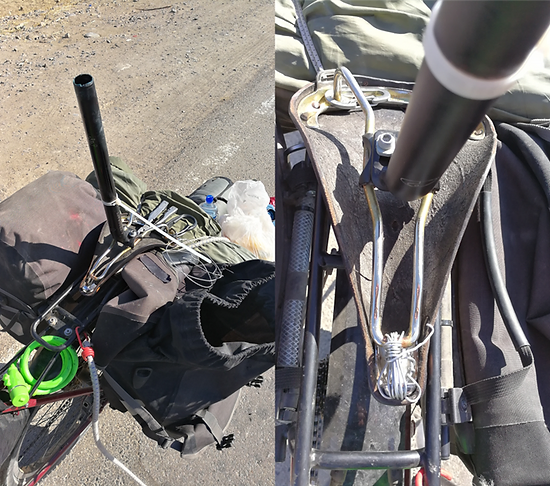
This was the only billboard I saw in the entire city area of Mary:
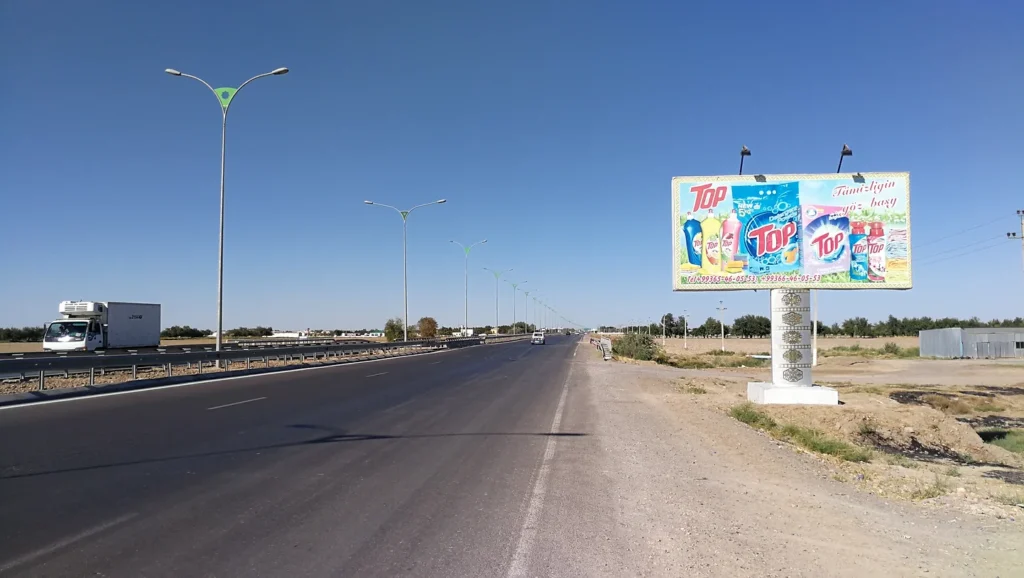
Who decided to put the billboard here, and why? Are the two phone numbers related to two product categories? Why do the phone numbers differ in the 5th digit and not the end? Who calls those numbers? Who picks up and what’s the conversation then about? Is this billboard illuminated at night with the spotlights?
In Mary I turned towards Türkmenabat and my border exit point in the northeast.
Mary has many massive buildings and plazas, all marble. It felt strange that there were almost no people in the streets and I cycled out of the city soon to find a place to camp before sunset.
In Baýramaly I left the highway and pitched camp between some fields. I was happy about having cycled 145 km today despite the bike issues – time to cook a large dinner.
What’s your perspective on leadership of others?
In my view every human has the potential to lead others in many different ways – but we have to start by leading ourself.
When we are balanced inside, when we are connected to our true feelings, we act automatically with clarity, authenticity, and decisiveness.
Other people are intelligent and usually have fine antennas picking up why we act in a certain way – when they feel that we serve the greater good instead of our ego, when they feel that we care for them and ourself equally, we win their trust and respect.
Like many others expressed before me, I also think that true leaders in the 21st century think global while fostering relationships with empathy local. A true leader feels inside herself or himself what’s the right thing to do, and creates an atmosphere where other humans feel emotionally secure to express themselves – allowing honest discussions to find agreements and compromise where opinions differ. But a true leader can also make the calls, fast and hard, if situationally required.
A true leader sees further, reduces complexity, and gives direction and motivation based on personal values and convictions she or he stands up for. But when new facts emerge, a true leader is not defensive and calmly changes course as the deeper serving of the greater good remains unchanged.
A true leader takes healthy risks and faces challenges with a positive base attitude – an attitude that is robust. A true leader makes other people around her or him feel strong and motivated. A true leader brings out the best in other people in the awareness that we all constantly lead each other in the large web of humanity – leadership is reciprocal.
Yesterday evening I had dragged my bike over a dry irrigation canal which was full of water in the morning, preventing me from crossing back – occupational risk venturing into the wild.
I found a bridge nearby, no problem. I guess the farmers irrigate their fields early in the morning to avoid loosing too much water through evaporation in the afternoon heat.
I really liked cycling in Turkmenistan – uncharted territory is always energizing, be it “out there” in our physical reality or “inside myself”. What should ever go wrong?
Day 150 since leaving Berlin, 10,000 km cycled – do numbers matter?
Such “round” numbers have aesthetic value and I think it’s important to sometimes celebrate such things with a healthy dose of fun and joy – but in my view it’s other things in life that matter.
I once ran a 100 km race on a course with two out-and-back loops in California. Just when I had completed 50 km and went out again, the ultrarunning professional Rob Krar came in finishing the 100 km … having run twice as fast. Instead of only focusing on his finish Rob took a moment to give me a motivational “Good job!” with a smile – the gesture resonated in me.
Meanwhile he became of running coach with a life perspective I find inspiring:
“Ultimately, becoming a successful endurance athlete only matters as much as it can be leveraged for good in the community and for the causes closest to my heart. I hope my performances can serve as inspiration for others to make positive changes in their lives.”
A true leader cares for others and the community.
Fixed fuel prices (or at least no electric price display), Octane 80 still available – just like the absence of advertisement also regarding technology Turkmenistan has a calming effect.
Leaving the irrigated areas around Mary, the landscape for the next 200 km until Türkmenabat was pure desert – the Karakum desert covers over 80% of the total area of Turkmenistan.
“Derýasy” means river but in reality it’s an artificial canal. Interestingly, the “316 km” don’t indicate something ahead, but rather the distance of the canal towards the east until the point where it diverts water from the Amy Darya river at the Afghanistan border.
Do you think people living in the desert have more clarity about their self-leadership given fewer distractions?
I would really be interested to learn about their inner experience, their perception of the consciousness journey they make and we all make – I’m sure I could learn a lot.
Do you think the people living in the desert sometimes feel into oneness?
Perhaps they do it a lot, naturally, without making it a big consciously articulated thing.
Do you think the people living in the desert use their reality-bending force for the greater good?
I think the desert is good in teaching us the value of team play – here you can’t do it all alone, you have to be there for each other to survive.
I found a welcome break from the afternoon heat in Bagtyýarlyk şäherçesi (“The town of happiness”) which was basically a truck stop.
Excellent food – the second time I ate at a truck stop in Turkmenistan and again I thought that’s the best food I have ever eaten.
Who of us is wild and who is domesticated?
Lebap province said welcome – “Lebap” means riverside as this province is crossed by the Amu Darya river in the north along the border with Uzbekistan.
Some headwind in the afternoon – even when it’s not that strong the headwind reduces your average speed and you drink more water. Despite starting early and cycling all day, today I only covered 120 km.
In the evening I just went over a sand dune next to the road and slept on the ground. This spot in the middle between Mary and Türkmenabat meant in a circle of 100 km around me there was nothing but uninhabited desert and emptiness.
Zero light pollution from settlements in combination with a cloud-free sky creates something special.
Out there, it’s the glimpse at billions of galaxies and stars. Inside, it’s a feeling of fascination.
What does serving the greater good mean to you?
I think every human is a leader serving something larger than himself or herself – it’s somehow woven into the fabric of life.
I would be interested to learn your perspective on this. I’m sure your individual life with all the ups and downs has taught you many valuable lessons other people can benefit from – whoever you are reading this, I do believe that your life is important.
I’m pretty sure you have thought about this before in your ongoing consciousness meditation. I believe that every day of our life we all think about what’s right and wrong somehow, and then we act the best way we can based on what feels right … more or less reflected.
So in the awareness that I can’t tell you something new, here is a thought I would like to share: do it, the whole living from the heart and being yourself thing – it’s going to be ok and you are going to feel better.
Our life passes so fast that if in doubt, leaning towards being brave and taking a risk and just trying something out is usually better than hesitating.
Breathing in, breathing out.
I started cycling early and reached a water supply point in the Repetek Nature Reserve around 9:30am. It’s one of Central Asia’s hottest places where temperatures reach 50°C / 122 °F.
Surprisingly, across the Karakum desert there are always some bushes. It’s the highly heat-resistant black saxaul whose extensive root system stabilizes sand dunes.
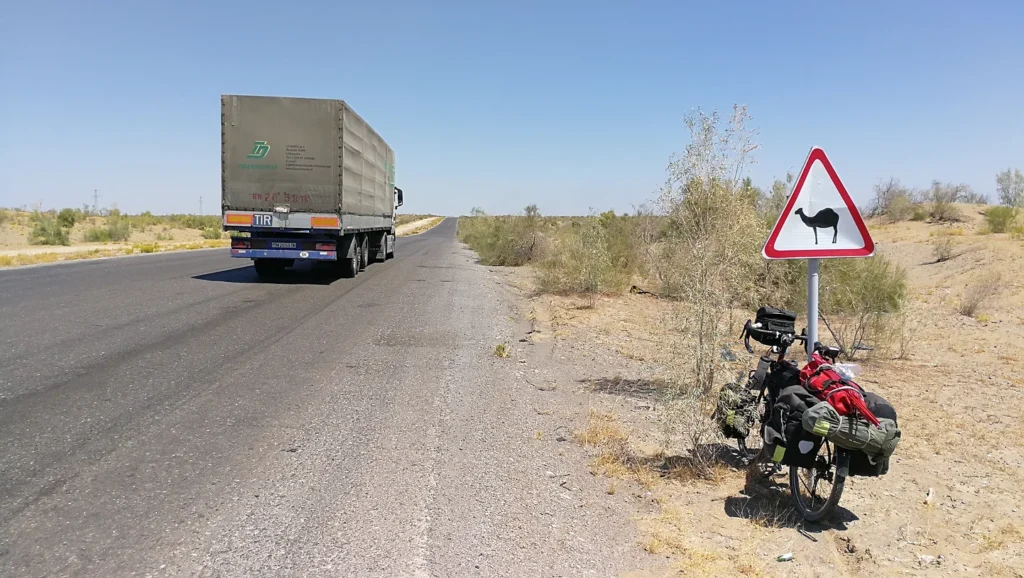
Türkmenabat lies north of the Karakum desert at the Amu Darya river. Given the abundant water supply the city has been a Silk Road crossroad for over 2,000 years.
To get a break from the mid-day heat, I spent two hours in a small restaurant where I was once more impressed by how delicious food in Turkmenistan is.
Türkmenabat is Turkmenistan’s second largest city with about a quarter million inhabitants. There are large shiny marble buildings along the main roads while on the small roads it has a countryside feeling.
Before leaving the city I parked my bike for 3 minutes to spend my last Manat on 15 liter of water and bananas – pretty hot day:
Time to cycle across the mighty Amu Darya river which separates Türkmenabat from the border region near Farab.
I stopped on the empty bridge fascinated by the volume of the flowing water. This river has stories to tell as it springs far away where the world’s four tallest mountain ranges meet: Pamir, Karakoram, Hindu Kush, and Himalayas.
The source region of this river was where I wanted to go. I hadn’t planned my exact onward route but knew that soon I would cycle along the Afghanistan-Tajikistan border following this river upstream.
How did early Silk Road travelers traverse this river hundreds of years ago? Was there something like a ferry service which also took horses and camels of merchant caravans? Could they cross on ice in winter? Or was the water level from the glaciers so much lower outside the summer season that you could wade through?
Just imagine people like Marco Polo traveling the Silk Road in the 13th century – those were true adventurers! Just imagine being the first traveler standing at such a mighty river thinking about how to cross it – and then you figure it out.
Regarding consciousness exploration, I think all humans are in the same situation … thousands of years ago when they wrote the Upanishads, thousands of years in the future, you and me today: uncharted territory awaits inside ourselves to be explored by the curious and brave.
For me as a 21st century traveler, all that remained today was to find a place to sleep. I cycled northeast and pitched camp in the desert close to the border crossing – entering Uzbekistan was for tomorrow.
Where do our destinations come from in our life? And what’s the relationship between our destinations “out there” (mountain ranges, river sources …) and our destinations “inside” (feelings …)?
You have your own individual answer to these questions and your answers are important – whatever your consciousness holds, I have compassion for you my human brother or sister reading this.
For me, I always had a big love for nature and adventure and for exploring the world. After having climbed the academic career path with years of minimal payment and non-permanent contracts, it was fantastic to get a guest professorship for business ethics at the University of Kassel … but for me leaving it behind and going on a bike tour was the right life decision.
I remember a book I read when I finished high school. It was the story of a couple who did a wild motorcycle tour around the world (“Abgefahren – In 16 Jahren um die Welt“) – their story touched me and the inspiration always lingered in the back of my mind. Still today when I look at the book I get the same feeling it created back then, a deep feeling that called me: the longing for adventure, the desire to be free.
I’m just a cyclist and many people have cycled across the world before me – this bike tour is not something special. On your individual consciousness journey through life, dear reader, you will make other unique experiences and I think all our life paths have the same value.
What unites us all, in my opinion, is that we have a certain responsibility to take care of our dreams – by listening into our feelings, by practicing self-leadership, by finding out who we really are …
Before sunrise I packed up camp with the plan to reach Bukhara this evening – the 125 km should be doable.
When I picked up my tent and shaked it out, I heard the sand moving over the inner tent floor. But why did that noise not stop after all the sand was out?
It took me several seconds to realize that there was an agitated snake next to my foot which made a rattling sound similar to the sand being shaken out – she had been under my tent before and didn’t like that I took her cover away.
Inside the Turkmenistan border building there was a wall with large paintings of the president doing different sports, and in the middle he is portrayed riding a bicycle with a smile.
Turkmenistan, thank you for the impulses on leadership. On our further consciousness expedition, perhaps it’s a good idea to remember that we are all connected and that everybody is a leader both of himself/herself – and of others.
